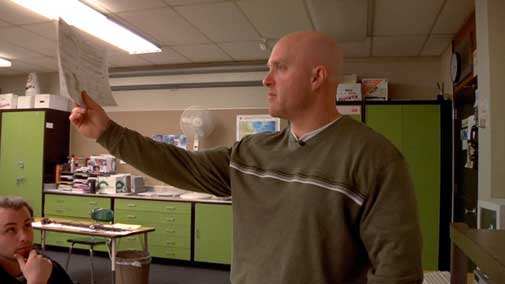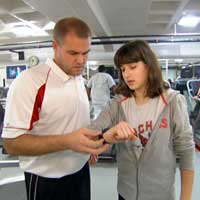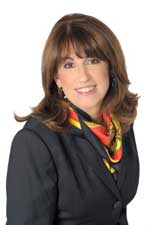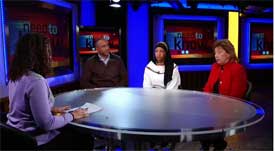
A chemistry course that puts an equal emphasis on proper uses of commas and periods as on the periodic chart is part of a program that has helped lift graduation rates much higher at a Massachusetts high school. And at an Illinois high school, starting students' days with physical education has raised their heart rates and, as a result, their grades in the six years since the program was started.
This week's Need to Know (8:30 p.m. ET Friday, Feb. 11, on PBS -- check local listings) includes these stories in a single-subject program that looks at examples of education innovations devised and activated by the actual faculty members who were frustrated by the walls they kept hitting in trying to effectively teach their students...
It's a fascinating hour. At Brockton High School, south of Boston, uniform testing results showed 75 percent of its 1998 students weren't going to graduate because of low math and/or English skills. A core group of teachers decided to make changes by integrating reading and writing skills into every course taught there. Some faculty members protested (including a book-burning) and some left. Others were reluctant; a science teacher, now fully behind the idea (shown at top above) initially thought it was useless meddling.
But the scores improved, and one of the early instigators for change now is the principal there, where success continues and has been recognized as a model for other schools to follow.

The academic results, in many cases, were just as low at a suburban Chicago high school six years ago. A man who taught physical education at the school, Naperville Central High, championed an idea that links higher academic performance to physical activity before problem classes. Here too, the grades of participating students showed marked improvements.
In a third segment, at a Maryland college, students taking science classes have been moved out of that age-old venue of tedium and confusion, the giant lecture hall, to small groups in which they investigate and solve problems together. As a result, the number of students dropping out of science-related majors has decreased there.

In an interview this week, Shelley Lewis, the news series' executive producer, said the decision to look for such "change agents from within" grew from a story they did late last year about results of worldwide testing that showed American schools doing worse than many in other countries.
An interview with a Finnish educator pointed out approaches in his country not being taken in U.S. schools. Though the story was relatively short, Lewis said, the full interview ran on the Need to Know website, "and we were deluged" with responses from people interested in this "hot-button issue."
Over several months, staff members found these and other stories that demonstrated educators' ingenuity in solving their school's problems. The decision was made to follow the stories with a panel discussion with educators as the hour's fourth segment.
Panelists include Susan Szachowicz, the Brockton principal; Zakiyah Ansari, a parent leader with New York's Coalition for Educational Justice; and Dr. Pedro Noguera, an author and professor of education at New York University.

"It was great to see (the panelists') level of excitement" at what the show's stories reported, Lewis said. Need to Know has been structured since its start as a program that exists complementarily on the air and online, she said, adding, "The stories, we hope, will spur lots of teachers to come to our website and share with us their reactions and stories of what they've done."
Future programs will feature other stories that were discovered in producing this one. Lewis, whose 20-year news career includes posts with ABC, NBC and CNN, will look for further story ideas in the feedback.
This week's show is another example of how Need to Know is working hard and effectively to fill the footprints left by Bill Moyers, whose long-time news series it replaced. And addressing another replacement issue, Lewis clarified a recent New York Times story that reported that Need to Know was in danger of cancellation because it hadn't yet been renewed.
A point the story didn't include, Lewis said, was "that we didn't expect to know by now" whether a renewal would happen. Long-term story planning, she said, continues.